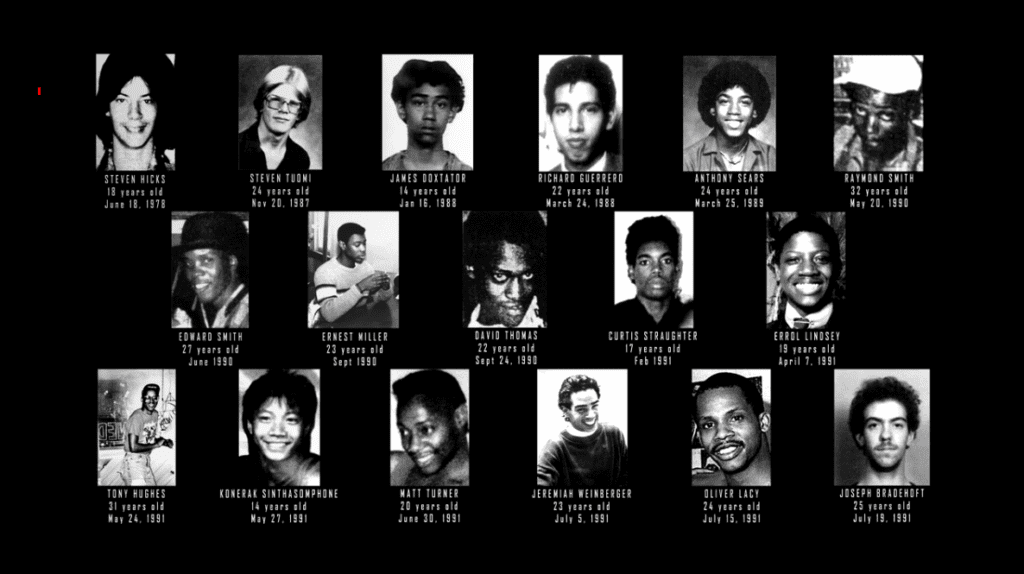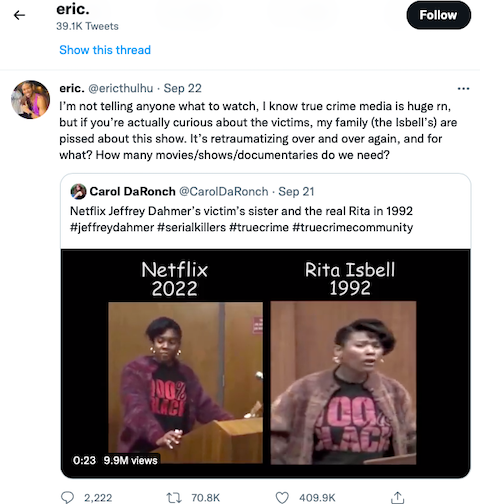Netflix recently released the TV series “Monster: The Jeffrey Dahmer Story.” The show is currently the #1 watched TV series on Netflix, but its popularity has not gone without immense hate and some serious ethical concerns regarding the show’s contents.
Jeffrey Dahmer was an American serial killer who was responsible for the dismemberment and murder of 17 men and boys between 1978 and 1991. He committed his first murder in Ohio and the subsequent murders in Wisconsin.
He has been nicknamed the “Milwaukee Cannibal,” because there was evidence to suggest Dahmer ate some of his victims.

Since his crimes, there have been numerous movies, documentaries and TV shows made about him. A relatively recent example is the 2017 movie “My Friend Dahmer,” with Ross Lynch starring as Dahmer.
The most recent show made about the serial killer, “Monster: The Jeffrey Dahmer Story,” is directed by Ryan Murphy, and Dahmer is played by Evan Peters (both of whom were involved in “American Horror Story”).
Temporarily putting ethical concerns aside, the show itself is well-made. The acting was very well done, especially Peters’s performance, and the show maintains the audience’s attention.
It is definitely not for those with a weak stomach, but it was not overly gorey, and there were few scenes that actually portrayed the victims’ deaths.
The show has been praised for its accuracy and paying great attention to details.
However, there were lots of time jumps and flashbacks, which could get a bit confusing at some points.
Something I thought the show did well was focus on the point of view of the victims and the victims’ families. Additionally, the show did an outstanding job of shining a light on the social issues surrounding the Jeffrey Dahmer case that many people, even those familiar with the case, may be unaware of.

Police incompetence and societal injustices that allowed Dahmer to continue committing these crimes are a central point of the show.
The negative attention the show has been receiving is due to the fact that many believe it is exploiting Dahmer’s victims and their families for a profit.
Additionally, the number of movies and shows focusing on Dahmer and other killers brings up the concern that these murderers are being perceived as characters, rather than real people who killed other real people.
Family members of Errol Lindsey, one of Dahmer’s victims, have expressed their disapproval of the show.
According to a “Rolling Stone” article, Lindsey’s sister, Rita Isbell, told another news outlet that “none of her family were contacted by the show’s creators, and it bothered her to see herself depicted on screen.”
Another member of the Isbell family, Eric Perry, spoke out in a series of tweets.

He continued, writing: “…no, they don’t notify families when they do this. It’s all public record, so they don’t have to notify (or pay!) anyone. My family found out when everyone else did.”
In another tweet, he wrote: “So when they’re doing this ‘with respect to the victims’ or ‘honoring the dignity of the families,’ no one contacts them. My cousins wake up every few months at this point with a bunch of calls and messages, and they know it’s another Dahmer show. It’s cruel.”
Defending the Netflix series, a Forbes article states that “… the show does do a lot of work to maintain the focus is on the victims, the ineptitude of the police and the damage that Dahmer left in his wake. Not only is he very clearly portrayed as a monster, but also just … kind of an asshole.”
In a promotional video, the lead actor said, “We had one rule going into this from Ryan [Murphy], that it would never be told from Dahmer’s point of view … It’s called ‘The Jeffrey Dahmer Story,’ but it’s not just him and his backstory–it’s the repercussions, it’s how society and our system failed to stop him multiple times because of racism [and] homophobia. It’s just a tragic story…”
I do find it a bit ironic that the show itself focuses on the victims and their families, but they could not extend the same courtesy to them in real life.
At the very least, the victims’ families should have been contacted.
With the rising popularity of true crime, it is important to remember that these stories are not just entertainment–they are someone’s reality.


